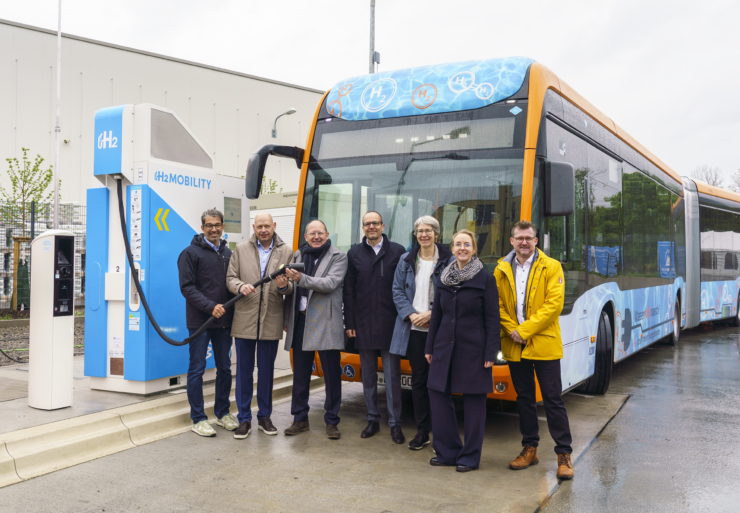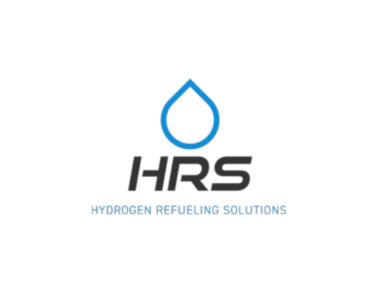New depot for alternative drive systems – public hydrogen refuelling station in Heidelberg goes into operation.
The public hydrogen refuelling station from H2 MOBILITY was officially put into operation today as part of the depot presentation for buses with alternative drive systems by Rhein-Neckar-Verkehr GmbH (rnv).
The new public hydrogen refuelling station offers a capacity of over 1,000 kg of hydrogen per day, three dispensers and—in addition to the refueling capacity for rnv’s 27 fuel cell range extender articulated buses—further refuelling options for H2 vehicles from the region. The refuelling station is operated by H2 MOBILITY and was also developed and built by the company. As part of the gradual commissioning, cars (700 bar) and trucks (350 bar) will also be able to refuel publicly at Wieblinger Weg 92, probably from May 2024. The hydrogen refuelling station will then also be used by Heidelberg’s waste collection service, which has had an emission-free vehicle with a fuel cell drive in its fleet since March 2023. The hydrogen refuelling station is conveniently located close to the A5 and the city.
Dr. Andre Baumann, State Secretary at the Baden-Württemberg Ministry of Environment, Climate Protection and the Energy Sector, said:
🔥 What about we co-host a webinar? Let's educate, captivate, and convert the hydrogen economy!
Hydrogen Central is the global go-to online magazine for the hydrogen economy, we can help you host impactful webinars that become a global reference on your topic and are an evergreen source of leads. Click here to request more details
The new rnv depot shows: The entry into the hydrogen economy has been achieved in the metropolitan region! that the metropolitan region has made a start in the hydrogen economy.
“Thanks to the 16.7 million euros funding for the H2Rhein-Neckar project from the from the Baden-Württemberg Ministry of Environment, hydrogen can be experienced locally by citizens in climate-friendly local public transport. In conjunction with the federally funded H2Rivers project, a hydrogen ecosystem with lighthouse character is being created here in the region. The hydrogen that can be refuelled at the Heidelberg depot comes from a short distance from Friesenheimer Insel in Mannheim,”
”A successful ramp-up of the hydrogen economy is of central importance for Baden-Württemberg—both to achieve the climate targets and to secure the industrial location. Pioneering projects such as those in the Rhine-Neckar metropolitan region are making decisive progress in this regard,”
The accompanying research in the H2Rhine-Neckar project also enables other regions to benefit from the experience gained. Among other things, the new depot will be used to analyze the ideal processes for buses with alternative drive systems in order to support bus companies in the transformation.
Elke Zimmer, State Secretary at the Baden-Württemberg Ministry of Transport, said:
Climate-friendly public transport is essential for sustainable mobility. Bus transport in particular, where the Clean Vehicle Directive sets clear targets for electrification, offers a lever for this.
“The climate targets can only be achieved if we reduce emissions. rnv is turning emission-free mobility into reality on site. The new depot creates the necessary infrastructural framework conditions for the use of alternative drive systems,”
“In order for the mobility transition to succeed throughout the state, it is important to pass on the experience gained from pioneering projects like this one. In addition to the accompanying research, the zero-emission bus network, which is coordinated by the state agency e-mobil BW and offers public transport operators and local authorities a forum for exchanging experiences, is also providing support,” Ms. Zimmer continued.
27 H2-eCitaro articulated buses, which Rhein-Neckar-Verkehr GmbH (rnv) is procuring in Heidelberg as part of the H2Rhein-Neckar funding project, will be parked at the depot, refuelled with hydrogen and charged with electricity. The project volume for the new depot is €24.5 million, including planning costs. The public hydrogen refuelling station and parts of the infrastructure are being funded by the Ministry for Environment, Climate Protection and the Energy Sector via the H2Rhein-Neckar hydrogen demonstration project.
Public hydrogen refuelling station for public transport, commercial vehicles and cars
Frank Fronzke, Managing Director and COO of H2 MOBILITY, explains:
In Heidelberg, one of the most important refuelling station projects of the year is officially starting operations today.
“The hydrogen refuelling station is the first in a series of new H2 MOBILITY openings and is the first of our four new stations in the Rhine-Neckar region.” Further public hydrogen refuelling stations that H2 MOBILITY will build and operate in the region will be built in Mannheim by summer 2024, in Frankenthal by the end of 2024 and in Ludwigshafen by the beginning of 2025. “The size and capacity of the new stations represent a new generation of H2 refuelling stations. Using high-performance technology, several 350 and 700 bar vehicle types can refuel at the same location—buses, trucks, light commercial vehicles and cars. The location in Heidelberg and the upcoming new openings demonstrate the importance of partnerships with local players who are determined to drive forward the mobility transition. The collaboration is currently creating a high-performance, comprehensive refuelling station network for public transport, transport logistics and private vehicles in this region. We look forward to contributing to the establishment of a high level of supply security and ensuring high availability with our experienced team.”
Mobility with hydrogen becomes tangible
The H2-eCitaros use both the battery and the fuel cell for propulsion, which enables a greater range and thus emission-free bus transport even on longer and hilly sections, such as those frequently found in Heidelberg. The new vehicles are expected to be on the road in Heidelberg from June 2024 so that citizens can experience mobility with hydrogen for themselves. Prior to this, the refuelling system, vehicles and processes at the new depot will be tested extensively over the next few weeks and staff will be trained.
Raoul Schmidt-Lamontain, Mayor for Climate Protection, Environment and Mobility, said:
The hydrogen economy offers Heidelberg many new opportunities and possibilities for an attractive mobility transition:
“With the hydrogen buses, we can make Heidelberg’s bus network more modern and environmentally friendly. This will particularly benefit us in Heidelberg’s topographically challenging terrain,”
“The city of Heidelberg and rnv are also using the buses to significantly develop the city’s existing hydrogen fleet, which already includes six hydrogen vehicles. Private individuals and companies can also benefit from these opportunities at the depot. The infrastructure offers them the opportunity to switch to environmentally friendly hydrogen technology with their vehicles. In this way, we are also investing in the future of the city and the region,” explains Schmidt-Lamontain.
Christian Specht, Mayor of Mannheim and Chairman of the Supervisory Board of rnv, emphasizing:
The rnv hydrogen depot in Heidelberg, together with the procurement of hydrogen buses for Heidelberg, Ludwigshafen and Mannheim, is an important milestone on the way to climate-neutral local public transport.
“The H2Rhine-Neckar and H2Rivers projects and the new depot with a public hydrogen filling station also contribute to the development of a hydrogen-based value chain throughout the region,”
“This shows that rnv, the cities and the region are pulling together for decarbonization and the energy transition.”
Christian Volz, Commercial Director of rnv, said:
Although it is always more environmentally friendly to use the bus or train instead of your own car, we don’t want to rest on our ecological laurels.
“Our goal is therefore to convert our entire vehicle fleet to locally emission-free drives by 2032. We are open to all technologies and are focusing on both conventional e-buses and e-buses with fuel cells. Depending on what makes more sense under the local conditions,”
“In Heidelberg, we have comparatively long bus routes, some of which also have a few meters of altitude to overcome. In addition, we use a lot of articulated buses in Heidelberg for capacity reasons, and it makes sense to use a fuel cell here simply because of their weight. Accordingly, the lion’s share of our new H2 eCitaros will be used here,” Volz continues. “For this reason, I am delighted that we can now open our new depot after a good year and a half of construction. Especially because the construction was not easy due to the combination of two different infrastructures and the difficult market situation.
Pilot project for hydrogen mobility in the Rhine-Neckar region
A hydrogen ecosystem is being created in the Rhine-Neckar metropolitan region with one of the largest demonstration projects for H2 mobility in south-west Germany: the H2Rhein-Neckar and H2Rivers projects are testing the use of new hydrogen technologies and providing new insights for the development of a regional value chain.
Isabell Knüttgen, Head of Hydrogen Activities at the state agency e-mobil BW, explains:
Demonstration projects such as H2Rhein-Neckar and H2Rivers are crucial for the development of a hydrogen economy.
“They gather important experience for the further development of technologies and form a basic framework so that a hydrogen ecosystem can function and grow—this can only succeed through cooperation along the entire value chain. We see mobility as a pacemaker for the ramp-up of the hydrogen economy; the basic prerequisite for this is a parallel development of the infrastructure and delivery of vehicles.
Public transport with hydrogen mobility can also be experienced in the region beyond Heidelberg: rnv is procuring 13 additional H2 eCitaros for use in Mannheim and eight for Ludwigshafen. In addition to the buses, the use of hydrogen and fuel cell technology is also being tested in other vehicles, including fuel cell waste collection vehicles.
READ the latest news shaping the hydrogen market at Hydrogen Central
New depot for alternative drive systems – public hydrogen refuelling station in Heidelberg goes into operation. source








